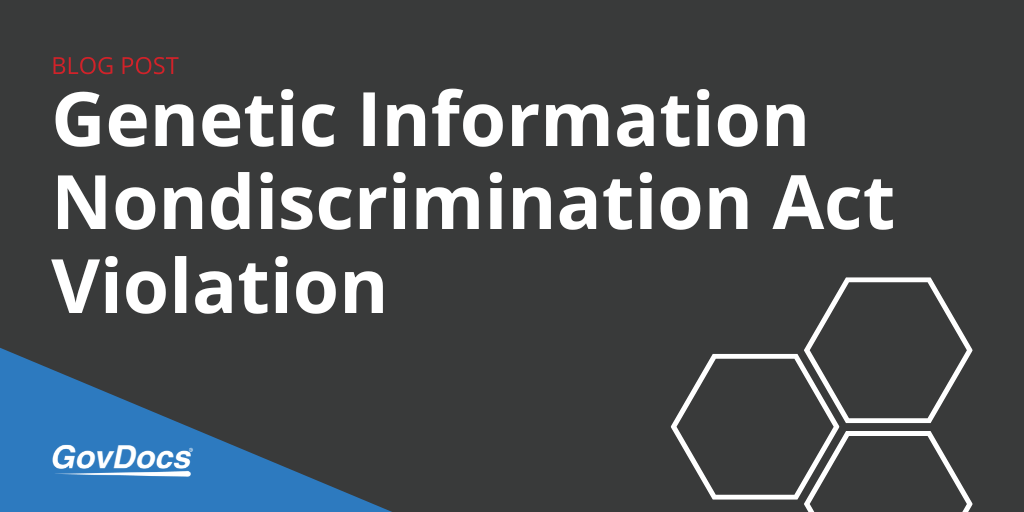EMPLOYMENT LAW NEWS
Genetic Information Nondiscrimination Act Violation
Published Aug. 8, 2022

In the first settled case of its kind, a U.S. employer was found in violation of both the Genetic Information Nondiscrimination Act of 2008 (GINA) and the Americans with Disabilities Act (ADA).
Fabricut, Inc., a distributor of decorative fabrics, will pay $50,000 to settle a disability and genetic information discrimination lawsuit filed by the U.S. Equal Employment Opportunity Commission (EEOC). The EEOC enforces federal laws prohibiting employment discrimination.
This is the first lawsuit ever filed by the EEOC alleging genetic discrimination.
Here are three key lessons employers should remain mindful in terms of hiring, promotion, and termination policies.
-
Employers: Ask No Family Medical History Questions
Employers should be sure they are not requesting information regarding family medical history at any time during the hiring process or employment.
When Rhonda Jones’ temporary position at Fabricut was coming to an end, she applied for a permanent job. She received a preliminary offer from the company for permanent employment, contingent on pre-employment screening. The court ruled that Fabricut violated GINA by asking Jones questions about her family medical history during a post-offer, pre-employment medical examination.
“Employers need to be aware that GINA prohibits requesting family medical history,” said David Lopez, General Counsel of the EEOC.
GINA restricts employers from requesting, requiring or purchasing such information. GINA was signed into law in 2008 and took effect in 2009. Title II of GINA makes it illegal for employers to discriminate against employees or applicants based on their genetic information. GINA also restricts employers from requesting or obtaining genetic information, which includes any information about an employee or applicant’s family medical history.
-
No Loopholes for Third-Party Medical Providers
Requesting family medical history through a third-party medical provider or examiner violates GINA.
After making Jones an offer of permanent employment, Fabricut sent her to its contract medical examiner, Knox Laboratory, for a pre-employment drug test and physical. As part of the physical, Jones was required to disclose disorders in her family medical history.
“Although GINA has been law since 2009, many employers still do not understand that requesting family medical history, even through a contract medical examiner, violates this law,” said EEOC Regional Attorney Barbara Seely.
Note: GINA does not prohibit health insurers or health plan administrators from obtaining and using genetic test results in making health insurance payment determinations.
-
Increased Enforcement Puts Employers’ Policies in Spotlight
The EEOC is launching a coordinated investigation and enforcement effort as part of its Strategic Enforcement Plan across the spectrum of equal employment law, which includes genetic discrimination. Although this case is considered the first one settled under GINA, it also brought to light violation of the ADA.
As part of a physical examination on Jones, Knox Laboratory concluded she suffered from carpal tunnel syndrome. Jones’ personal physician countered that Jones did not have carpal tunnel syndrome, but Fabricut rescinded its job offer based on the findings of Knox Laboratory.
In addition to the GINA violation, the EEOC alleged that Fabricut violated the ADA’s prohibition against discriminating against qualified individuals with disabilities (or perceived to have disabilities) when it rescinded Jones’ employment offer based on the belief that Jones had carpal tunnel syndrome.
In addition to the $50,000 settlement, Fabricut will post an anti-discrimination notice to employees, dissemination of anti-discrimination policies to employees and providing anti-discrimination training to employees with hiring responsibilities.
This Employment Law News blog is intended for market awareness only, it is not to be used for legal advice or counsel.
Keep Informed
with GovDocs Employment Law News
What is GovDocs?
GovDocs simplifies employment law compliance for large, multi-jurisdiction employers in the U.S. and Canada. The GovDocs software platform integrates three solutions in one convenient place to help you master the employment laws impacting your business. Whether you manage a postings, minimum wage or paid leave program, our products cut through research time, provide proactive insights into the everchanging landscape of employment laws and reduce the risk of noncompliance. The company is headquartered in Eagan, Minn.
The GovDocs Poster Store simplifies posting compliance for employers with less than 30 locations across all industries, offering a variety of posting products to meet your labor law compliance needs.



